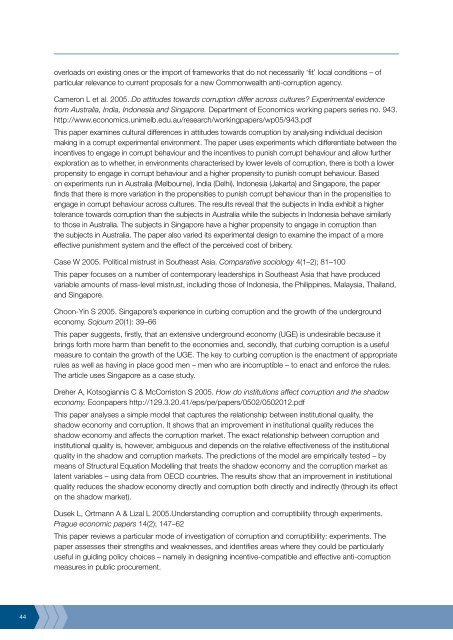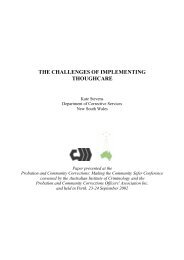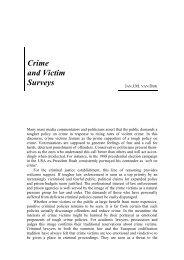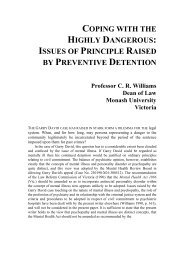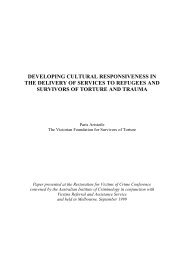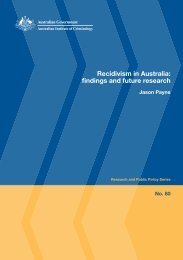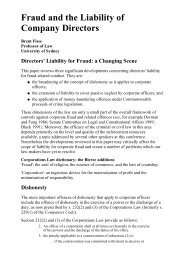Review of anti-corruption strategies Rob McCusker - Australian ...
Review of anti-corruption strategies Rob McCusker - Australian ...
Review of anti-corruption strategies Rob McCusker - Australian ...
You also want an ePaper? Increase the reach of your titles
YUMPU automatically turns print PDFs into web optimized ePapers that Google loves.
overloads on existing ones or the import <strong>of</strong> frameworks that do not necessarily ‘fit’ local conditions – <strong>of</strong><br />
particular relevance to current proposals for a new Commonwealth <strong>anti</strong>-<strong>corruption</strong> agency.<br />
Cameron L et al. 2005. Do attitudes towards <strong>corruption</strong> differ across cultures? Experimental evidence<br />
from Australia, India, Indonesia and Singapore. Department <strong>of</strong> Economics working papers series no. 943.<br />
http://www.economics.unimelb.edu.au/research/workingpapers/wp05/943.pdf<br />
This paper examines cultural differences in attitudes towards <strong>corruption</strong> by analysing individual decision<br />
making in a corrupt experimental environment. The paper uses experiments which differentiate between the<br />
incentives to engage in corrupt behaviour and the incentives to punish corrupt behaviour and allow further<br />
exploration as to whether, in environments characterised by lower levels <strong>of</strong> <strong>corruption</strong>, there is both a lower<br />
propensity to engage in corrupt behaviour and a higher propensity to punish corrupt behaviour. Based<br />
on experiments run in Australia (Melbourne), India (Delhi), Indonesia (Jakarta) and Singapore, the paper<br />
finds that there is more variation in the propensities to punish corrupt behaviour than in the propensities to<br />
engage in corrupt behaviour across cultures. The results reveal that the subjects in India exhibit a higher<br />
tolerance towards <strong>corruption</strong> than the subjects in Australia while the subjects in Indonesia behave similarly<br />
to those in Australia. The subjects in Singapore have a higher propensity to engage in <strong>corruption</strong> than<br />
the subjects in Australia. The paper also varied its experimental design to examine the impact <strong>of</strong> a more<br />
effective punishment system and the effect <strong>of</strong> the perceived cost <strong>of</strong> bribery.<br />
Case W 2005. Political mistrust in Southeast Asia. Comparative sociology 4(1–2); 81–100<br />
This paper focuses on a number <strong>of</strong> contemporary leaderships in Southeast Asia that have produced<br />
variable amounts <strong>of</strong> mass-level mistrust, including those <strong>of</strong> Indonesia, the Philippines, Malaysia, Thailand,<br />
and Singapore.<br />
Choon-Yin S 2005. Singapore’s experience in curbing <strong>corruption</strong> and the growth <strong>of</strong> the underground<br />
economy. Sojourn 20(1): 39–66<br />
This paper suggests, firstly, that an extensive underground economy (UGE) is undesirable because it<br />
brings forth more harm than benefit to the economies and, secondly, that curbing <strong>corruption</strong> is a useful<br />
measure to contain the growth <strong>of</strong> the UGE. The key to curbing <strong>corruption</strong> is the enactment <strong>of</strong> appropriate<br />
rules as well as having in place good men – men who are incorruptible – to enact and enforce the rules.<br />
The article uses Singapore as a case study.<br />
Dreher A, Kotsogiannis C & McCorriston S 2005. How do institutions affect <strong>corruption</strong> and the shadow<br />
economy. Econpapers http://129.3.20.41/eps/pe/papers/0502/0502012.pdf<br />
This paper analyses a simple model that captures the relationship between institutional quality, the<br />
shadow economy and <strong>corruption</strong>. It shows that an improvement in institutional quality reduces the<br />
shadow economy and affects the <strong>corruption</strong> market. The exact relationship between <strong>corruption</strong> and<br />
institutional quality is, however, ambiguous and depends on the relative effectiveness <strong>of</strong> the institutional<br />
quality in the shadow and <strong>corruption</strong> markets. The predictions <strong>of</strong> the model are empirically tested – by<br />
means <strong>of</strong> Structural Equation Modelling that treats the shadow economy and the <strong>corruption</strong> market as<br />
latent variables – using data from OECD countries. The results show that an improvement in institutional<br />
quality reduces the shadow economy directly and <strong>corruption</strong> both directly and indirectly (through its effect<br />
on the shadow market).<br />
Dusek L, Ortmann A & Lizal L 2005.Understanding <strong>corruption</strong> and corruptibility through experiments.<br />
Prague economic papers 14(2); 147–62<br />
This paper reviews a particular mode <strong>of</strong> investigation <strong>of</strong> <strong>corruption</strong> and corruptibility: experiments. The<br />
paper assesses their strengths and weaknesses, and identifies areas where they could be particularly<br />
useful in guiding policy choices – namely in designing incentive-compatible and effective <strong>anti</strong>-<strong>corruption</strong><br />
measures in public procurement.


